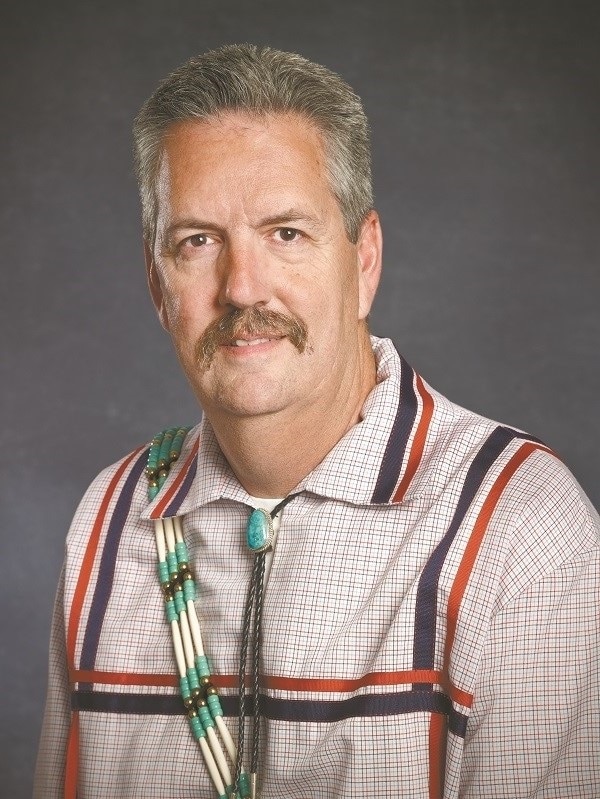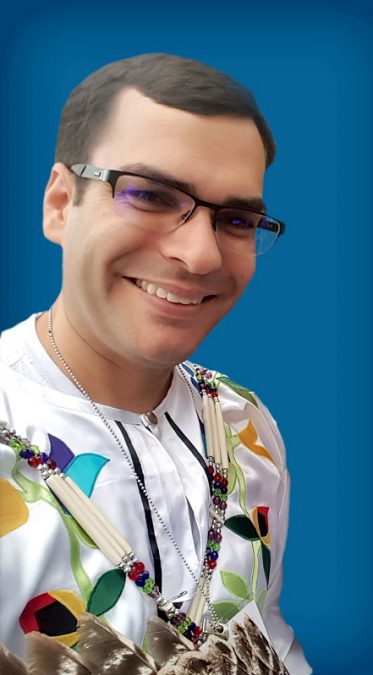
Johnson lines up another District 7 seat run
In the year’s only contested legislative session, District 7 incumbent Mark Johnson is running for a third term in office against challenger Browning Neddeau.
Johnson first successfully ran in 2010 before winning re-election in 2014.
Responding to inquiries as a representative for the Citizen Potawatomi Nation members over two legislative terms echoes his experience as a first responder in California.
He has more than 38 years of service as a California firefighter and serves as the Unit Chief for the Fresno-Kings Unit of California Department of Forestry and Fire Protection. In this day-to-day job, Johnson manages the operations of more than 20 firehouses and their staff from his headquarters in Fresno County.
The Vieux family descendent describes his service as a Tribal legislator and a first responder as challenging responsibilities and ones he remains up to. His desire to seek another term as the representative for northern portions of California, Nevada and Utah was inspired by his father’s efforts to remain close to Citizen Potawatomi Nation.
His father, Richard Vincent Johnson, was born in Tecumseh, Oklahoma. Like many Oklahomans of the era before and after WWII, he went west to California in search of better opportunities for his family. Despite the distance, the elder Johnson instilled in his son a sense of commitment to the Tribe. When possible, Richard would travel back to his home state to attend Tribal gatherings and government meetings, including the annual general council.
In 1972, Johnson made his first trip to his father’s state of birth, seeing firsthand the obstacles the Tribal government faced. In the days before legalized Tribal gaming, enterprises, money, facilities and a stable budget were all challenges. This familiarity with the Tribe’s trials and subsequent successes has filtered into Johnson’s views as a legislator.
With the growth of the Nation, Johnson also recognized a greater desire for members to learn more about the Tribe’s history but also their unique family trees. Accompanying the requests for information about services, the incumbent said he’s seen a greater desire from his constituents to learn about Citizen Potawatomi’s past.
“The Tribe is constantly evolving, people wanting to learn about the history of our people. We had very little as a result of our past. You get moved across states every decade or so, you lose a lot of your history,” Johnson said. “What we’re doing now is to try and get that history back for the coming generations. That’s been one of the more rewarding aspects of being in the legislature, being able to help move that forward.”
Johnson cites his own experiences as examples when he helps connect Citizen Potawatomi with resources at CPN’s Cultural Heritage Center and the Tribal Rolls Department. His grandfather’s trunk from the Carlisle Indian School, given to him the day he enrolled, sits on display at the center, symbolizing a significant experience for many Indian Country families.
Governing lessons
As the Tribe has swelled with newly enrolled members in recent years, requests for more information on Tribal benefits, heritage and services have also grown exponentially. Finding answers for those ever-growing requests proved to be Johnson’s biggest challenge in his time as District 7 legislative representative.
“The most frustrating part for the average (Tribal citizen) to understand is the service areas,” he said. “The people out here want the same benefits that the people in Oklahoma have, but it just can’t be done because of the service areas like those for the health clinics.”
The two-term incumbent said that, unlike his counterparts in the Tribe’s home state, he sees his role as a sounding board for his constituents concerns first, then as a resource to help them find a solution to their needs.
“It’s about being able to point them in the right direction, so they can maximize the benefits they can get with the system that is in place,” Johnson said.
When asked to reflect on his time in office and how he views the role of Tribal government and its legislators, Johnson said efforts should be made to avoid a return to more challenging times.
“Serving as a Tribal legislator, it is incumbent upon us to make the correct decisions for the long-term survival of the Tribe. It’s really no different from any other government, but ours actually works,” he said, then laughed. “I am proud of that, even if we don’t agree on everything all the time.”
Johnson emphasized the need for legislators to balance their life experience with the Tribe’s history and contemporary structures to help guide it for future generations and a growing population.
Wanting to be that conduit is why he is running for a third term.
“Our biggest challenge in the near future is going to be the sovereignty issue,” he said. “When you get a group of people that is traditionally ostracized but has become successful, you become a target for groups like the state of Oklahoma. Protecting that will always be a challenge facing Tribal government.”

Neddeau follows the family path to District 7 candidacy
In the year’s only contested legislative session, Browning Neddeau challenges incumbent Mark Johnson for the District 7 seat.
The youngest of seven children, Neddeau grew up in Hollister, California, but now lives in nearby Marina. Following high school, he completed a bachelor’s degree in child and adolescent development with a minor in political science at San Jose State University.
Neddeau said he has always been interested in political science, inspired by his late uncle Browning Pipestem, a well-regarded Native American attorney and legal mind in Indian Country and his namesake.
Long dedicated to teaching music education, out of college, Neddeau transitioned to begin teaching music in his home state. He completed a master’s degree in teaching at the University of San Francisco while securing a multiple-subject teaching credential. Staying as an elementary school educator and teaching college classes at night, he then earned a doctorate in education at the same university.
“I believe that really helped me in my profession in understanding things in the education space. I grew as a professional, because at that time, I was being asked to lead other educators in professional development as well,” he recalled.
Neddeau’s education and studies focused on examining how arts education can influence students in their developing years; his doctoral project examined approximately 10,000 data points in an effort to deepen empirical information in the role the arts could play in the cognitive evolution of students.
“In arts research, there isn’t a lot of quantitative research,” he said. “I wanted to contribute to the development of that space.”
Potawatomi ties
Neddeau’s father is originally from Shawnee, Oklahoma, and instilled the ties to his Tribe in his youngest child. He often spent summers back in Oklahoma with his grandparents, who lived off Pottenger in Shawnee. These experiences allowed him to learn about the history and practices tied to his Native American heritage.
Inspired and taught in part by his uncle Pipestem, he began Southern Straight Dancing at age 5 and remembers participating in the Citizen Band Potawatomi Intertribal Powwow before it became the CPN Family Reunion Festival.
“I have been doing that for a long time, attending powwows and dancing, for a good number of years,” he said. “We would often go back to Oklahoma and participate in the Tribal meetings, gatherings and powwows.”
Neddeau credits those trips with helping along the path that has him running as a representative in Tribal government. He’s been voting in Tribal elections since age 18 and fondly recalls the opportunity to cast a ballot in the Tribe’s 2007 constitutional change.
“I’ve always been interested in political science, and being more involved in the Tribal government is something that has also been of interest to me,” he said.
Neddeau’s platform places an emphasis on better connecting Tribal members spread across widely distributed geographic areas.
“One of the things that I am doing as part of my campaign, which I also do in my daily work, is community engagement and community involvement,” he said. “That goes back to many generations of my family who felt equally involved in community and Native Pride work.”
Neddeau sees his run for office as an extension of a family habit of fostering Native American heritage. In the months ahead of the election, he is holding listening sessions across the district to meet with Tribal voters to hear their concerns and issues. He credits his grandfather, who helped publish a classroom study of Oklahoma tribes and was one of the hosts for the 1974 Potawatomi powwow, for instilling in him a sense of service to the Tribe. His grandfather also helped to establish the Shawnee Inter-Tribal Gourd clan, and he was an avid gourd dancer.
“We need to have community engagement opportunities in our district that are accessible to people,” he said.
Should he win the seat, it’s a practice he would emphasize. The locations of his listening sessions asa candidate were chosen with the intent of reaching the most CPN members possible.
When questioned on the challenge facing many non-Oklahoma-based Tribal legislators, extending services and opportunities available on CPN land to those outside the state, Neddeau said the listening sessions were just the start. The feedback he would receive from them will help shape his approaches to legislation, should he be elected.
The sessions will also attempt to foster closer ties with Native American communities and partners in the locales where they are held. Non-Potawatomi guests from other tribes or with ties to issues in Indian Country have been invited to attend to inform CPN members about Native issues in their own backyards.
Neddeau said, ultimately, the run for the district seat is to help develop a closer community among fellow members spread across three states and feels it isn’t currently where he believes it should be.
“What can we do (as legislators) in our districts to build a sense of community and belonging?” he asked. “In District 7, I hope that is something I’ll have an opportunity to do.”
